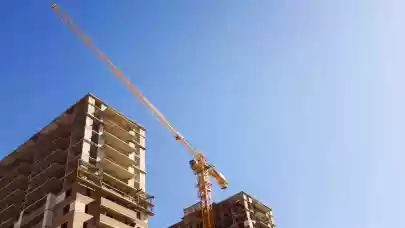
Bulgaria’s Recovery and Resilience Plan (RRP) aims to facilitate economic and social recovery from the COVID-19 crisis and to create a more sustainable, equitable, and successful economy. It includes a set of schemes not only to restore the economy's growth potential but to boost it, too. In achieving this, several construction projects to increase energy efficiency and decrease CO2 impact are to be implemented in 2023-2026, says Anita Dangova at EPI, EECFA’s Bulgarian research institute.
The EECFA (Eastern European Construction Forecasting Association) conducts research on the construction markets of 8 Eastern-European countries, including Bulgaria.
How the RRP will impact housing construction
One of the major projects provides support for sustainable energy-efficient renovation of the housing stock since, currently, only 7% of the floor area of occupied residential buildings complies with modern energy efficiency (EE) requirements. The project, to be launched by end-2022 with an implementation period till 2026, will attract a total of €607 million under the Recovery and Resilience Facility (RRF). Multi-family residential buildings will be eligible for financing nationwide and renovated units have to achieve 30% primary energy savings. Residential buildings to be financed under this scheme are divided into two groups depending on the time of application of owners' associations:
- applications until March 2023: 100% of the project funding will be provided from the RRP,
- applications from April 2023 to December 2023: 80% of the project funding will be provided under the RRP, and 20% will be in the form of self-contribution.
Another project with an implementation period till 2025 is dubbed “Program for the financing of single renewable energy measures in single-family and multi-family buildings”. Total planned funding is €123 million (€72 million from the RRP and €51 million in the form of national and private co-financing). The project aims to increase the use of renewable energy in final energy consumption in households by financing new solar systems for domestic hot water and photovoltaic systems. There are two measures:
- construction of solar systems for domestic hot water supply. The maximum amount of grant per individual household is to be 100% of the cost of the system, but no more than €1000;
- construction of photovoltaic systems up to 10 kW. The maximum amount of grant per individual household is to be up to 70% of the system cost, but no more than €7700.
How non-residential construction will benefit from the RRP
One of the projects finances - between 2022 and 2026 - the sustainable energy renovation of non-residential buildings owned by municipalities and national authorities (regional administrations, ministries); the Bulgarian Academy of Sciences; public-private partnerships for buildings in the field of production, trade and services; non-profit legal entities, municipal enterprises, and commercial companies. The project consists of two components: 1) €189 million (without VAT) to public buildings; 2) €120 million (without VAT) for manufacturing, commercial and service buildings.
Other non-residential projects worth mentioning under the RRP (both with an implementation period until 2026):
- Modernisation of educational infrastructure. The project aims to create conditions for equal access to education by building an enabling, inclusive, innovative, supportive and motivating educational environment. €348 million are earmarked.
- Supporting the development of industrial zones and parks and improve their connectivity to attract investments. The project, AttractInvestBG, complements the reform efforts to develop industrial ecosystems by building several industrial zones. These will have transport, energy, water and sewage infrastructure, ready to host new projects by limiting administrative and construction periods for manufacturing and/or logistic facilities. €325 million are planned.
RRP schemes in civil engineering
There are three projects in the subsector:
- National infrastructure for electricity storage from renewable energy (RESTORE): a project to solve the problems of the inability of renewables to participate fully in balancing the electricity system. €799 million are planned to be utilized by 2026.
- Ensuring sustainable transport connectivity through the construction of Phase 3 of Metro Line 3 in Sofia - "Hadji Dimitar" metro station - "Levski" residential area on a length of 3 km and 3 stations on €111 million. Construction is to take place in 2023-2026.
- Construction/reconstruction of water supply and sewerage systems, including wastewater treatment plants for agglomerations between 2000 and 10000 inhabitants. €200 million are planned with an implementation period of 2022-2026.
There are two reforms to be finalized by 2026 (to digitalize the construction sector in general):
- Pilot phase for the introduction of building information modelling in the investment design and construction. The project is regarded as a basis for a digital reform of the construction sector in Bulgaria.
- Unified information system for spatial planning, investment design, and construction permitting. The aim is to create a unified information system as a platform for the provision of electronic administrative services for spatial planning and construction permitting. The project will ease the administrative burden on citizens and businesses.
Risks to implementing RRP projects
These projects might face certain bottlenecks due to insufficient administrative capacity or the short period of implementation given the accumulated major delays. Construction-related projects under the RRP should have been in implementation since 2021 or early 2022, but now they are realistically to commence no sooner than early 2023.
In the field of renovation of residential buildings with public funds, potential risks might come if the lessons from previous programs are not learned when there have been numerous reports of poor-quality construction works, lack of monitoring in the selection of subcontractors, and the absence of clear indicators for energy efficiency, among others.
On top of that, the scale and size of these projects could also be negatively impacted by rising inflation and the hike in construction material prices, as well as steadily increasing labour costs.




